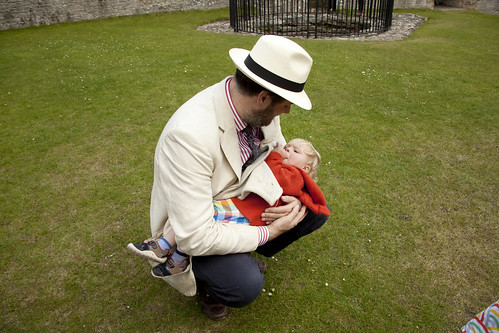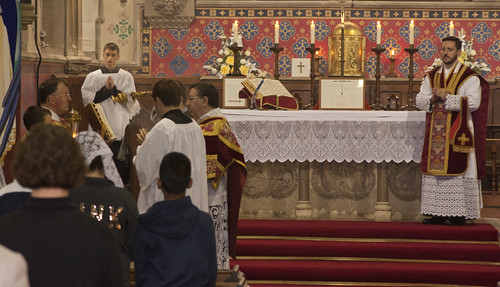-----------------------------------------------------
Some time ago I criticised the views of Russell Shaw (no relation) on the subject of clericalism and caesaropapism. He appeared to think, in his book To Hunt, To Shoot, To Entertain, that cases of caesaropapism, such as the Emperor Constantine regarding himself as holding ultimate authority over doctrinal matters, are actully cases of its opposite, clericalism: clericalism being the arrogation of lay authority by the clergy.
I have been thinking since then about the notion of 'clericalisation of the laity'. This term was popularised by Pope St John Paul II; it is used in Christifideles laici (1988: 23), but the most explicit discussion I have found is, for some reason, an address to the Bishops of the Antilles in 2002. As he explained, it
the confusion and the equating of the common priesthood and the ministerial priesthood, the lack of observance of ecclesiastical laws and norms, the arbitrary interpretation of the concept of "supply", the tendency towards a "clericalization" of the lay faithful and the risk of creating, in reality, an ecclesial structure of parallel service to that founded on the Sacrament of Orders.
When all is said and done, why would the laity want to do the jobs of clerics, by substitution, when they can do the jobs proper to their lay state instead, unless they are convinced of the clericalist idea that only clergy are important, that clergy are the Church's elite, with the power and prestige? It is not clericalism which wants to see clerical roles done by clerics, and lay roles done by laity, if we have a proper appreciation of the lay role.
But here is something important. When the laity act as substitute clerics, they must do so under clerical authority and direction. By making oneself a pseudo-cleric, one enters the clerical hierarchy, and one does so as the very lowest of the low. But when the laity perform their proper, lay, role, in the family, in the world of work, in politics, they do so with autonomy. This is the teaching of Vatican II (Aposticalam actuositatem: 24), and it would have been a familiar idea to Catholic fathers, merchants, and kings throughout history.
Beyond the liturgy, there are in fact a range of roles for the laity, with a range of relationships with the hierarchy. It is the role of the hierarchy to teach and judge on doctrinal and moral issues, so their 'mandate' is needed for lay people who are taking part in matters closely related to this 'apostolic' work. Again, everything done in the temporal sphere is subject to moral appraisal by the clergy. But the work of parents, the owners and managers of businesses, and statesmen, to build up the Kingdom of God is not just a matter of applying moral judgements: it is a matter of the prudential judgements which the graces of their own states of life, and their experience and training, enable them to make. Clerics without the grace of sacramental marriage, without business or political experience or training, are generally well aware of their limitiations in these fields. It is another manifestation of liberal clericalsim that liberal Catholics are constantly trying to get priests, bishops, and other hierarchs to pronounce on such matters to forward their own agenda.
Support the work of the LMS by becoming an 'Anniversary Supporter'.
 |
| Not a specifically clerical role. |
I have been thinking since then about the notion of 'clericalisation of the laity'. This term was popularised by Pope St John Paul II; it is used in Christifideles laici (1988: 23), but the most explicit discussion I have found is, for some reason, an address to the Bishops of the Antilles in 2002. As he explained, it
becomes a form of clericalism when
the sacramental or liturgical roles that belong to the priest are assumed by
the lay faithful, or when the latter set out to accomplish tasks of pastoral
governing that properly belong to the priest.
Again:
The commitment of lay persons is
politicised when the laity is absorbed by the exercise of ‘power’ within the
Church.
Curiously the Vatican website English language record of this address is partly in French, but I'm quoting from a news report here.
Pope Francis underlined this analysis
in response to the proposal of female cardinals:
Women in the Church must be valued
not ‘clericalised’. Whoever thinks of women as cardinals suffers a bit from
clericalism.
Thus, clericalisation is a false
response to a perceived problem of clericalism. Instead of denying the premise
of clericalism, that to the clergy alone in the Church belongs dignity and
authority, it attempts to redress the balance between clergy and laity in
favour of latter by allowing the laity a share of specifically clerical dignity
and authority. In practice only a small number of laity can be privileged in
this way, and a new, clericalised elite is created.
The correct response to clericalism,
underlined by Pope St John Paul II and taught by the Second Vatican Council, is
to accord the appropriate dignity and space to the roles of both clergy and
laity. Thus, the Second Vatican Council’s Decree on the Apostolate of the Laity,
Apostolicam actuositatem teaches:
The laity must take up the
restoration of the temporal order [ordo
temporalis] as their own special task. Led by the light of the Gospel and
the mind of the Church and motivated by Christian charity, they must act
directly and in a definite way in the temporal sphere.
This vision was reiterated strongly by Pope Benedict XVI in
his Encylcical Deus Caritas est. The laity alone can fulfil this
vocation of bearing witness to the Faith in the world, and of helping to
conform it to Christ. As the Decree goes on to detail, this can be done in the
context of family, professional, and political life.
What the laity do in the way of 'ministries' in the liturgy, and in doing things like parish catechism classes, they do by subsitution for clerics. This is not always bad: it is sometimes necessary for the worthy celebration of the liturgy, given the non-infinite resources of parish churches. Where clerical acolytes and clerical scholas aren't available, which is to say everywhere outside seminaries, lay people are routinely used even in the context of the Traditional Mass. The artificial creation of reasons to use lay people where clerics are available, by contrast, is condemned by Christifideles laici:
It is also necessary that Pastors guard against a facile yet abusive recourse to a presumed "situation of emergency" or to "supply by necessity", where objectively this does not exist or where alternative possibilities could exist through better pastoral planning.
The classic examaple is when the priest celebrant goes and sits down while his minions distribute Holy Communion. The principle would seem to extend to lay people reading the Epistle while the priest is present, though obviously this is a less serious issue. For in all cases of lay liturgical ministry, the purpose of the ministry is the worthy celebration of the liturgy, not the participation of the handful of lay people involved, and the motivation for getting lay people involved where this is not necessary would seem to be a clericalising clericalism. Again, Christifideles laici condemns:It is also necessary that Pastors guard against a facile yet abusive recourse to a presumed "situation of emergency" or to "supply by necessity", where objectively this does not exist or where alternative possibilities could exist through better pastoral planning.
the confusion and the equating of the common priesthood and the ministerial priesthood, the lack of observance of ecclesiastical laws and norms, the arbitrary interpretation of the concept of "supply", the tendency towards a "clericalization" of the lay faithful and the risk of creating, in reality, an ecclesial structure of parallel service to that founded on the Sacrament of Orders.
When all is said and done, why would the laity want to do the jobs of clerics, by substitution, when they can do the jobs proper to their lay state instead, unless they are convinced of the clericalist idea that only clergy are important, that clergy are the Church's elite, with the power and prestige? It is not clericalism which wants to see clerical roles done by clerics, and lay roles done by laity, if we have a proper appreciation of the lay role.
But here is something important. When the laity act as substitute clerics, they must do so under clerical authority and direction. By making oneself a pseudo-cleric, one enters the clerical hierarchy, and one does so as the very lowest of the low. But when the laity perform their proper, lay, role, in the family, in the world of work, in politics, they do so with autonomy. This is the teaching of Vatican II (Aposticalam actuositatem: 24), and it would have been a familiar idea to Catholic fathers, merchants, and kings throughout history.
Beyond the liturgy, there are in fact a range of roles for the laity, with a range of relationships with the hierarchy. It is the role of the hierarchy to teach and judge on doctrinal and moral issues, so their 'mandate' is needed for lay people who are taking part in matters closely related to this 'apostolic' work. Again, everything done in the temporal sphere is subject to moral appraisal by the clergy. But the work of parents, the owners and managers of businesses, and statesmen, to build up the Kingdom of God is not just a matter of applying moral judgements: it is a matter of the prudential judgements which the graces of their own states of life, and their experience and training, enable them to make. Clerics without the grace of sacramental marriage, without business or political experience or training, are generally well aware of their limitiations in these fields. It is another manifestation of liberal clericalsim that liberal Catholics are constantly trying to get priests, bishops, and other hierarchs to pronounce on such matters to forward their own agenda.
 |
| The proclamation of the Gospel: this is a specifically clerical role. |
No comments:
Post a Comment